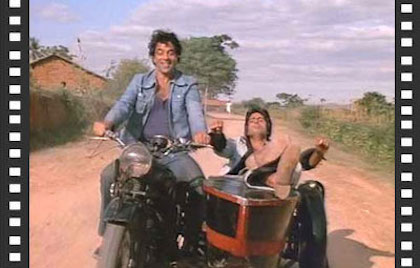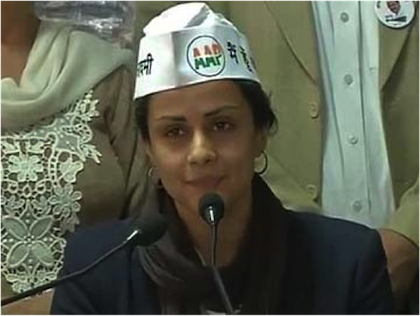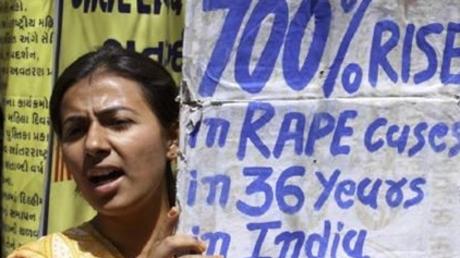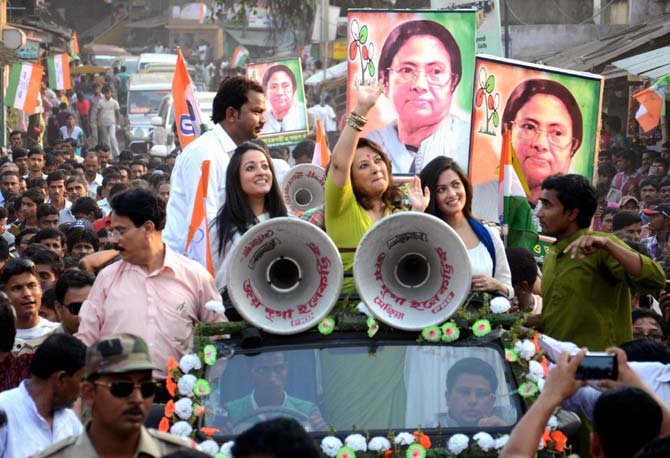“Roads Washed In Dry Bankura To Protect Moon Moon Sen” screamed the headlines when yester-year Bollywood star Moon Moon Sen (above), also a political contestant standing on a Trinamool Congress ticket, went campaigning for a seat this election.
In a perennially thirsty village, a three kilometre section of road was indeed doused just to ensure that Moon Moon Sen and her star daughters didn’t have to deal with the ‘inconvenient’ dust.
The local government didn’t seem to mind the political party's action, even though the entire Bankura district in West Bengal suffers from an acute shortage of drinking water in summer. And despite the drain on their precious resource, huge crowds turned out to greet the celebrity entourage. Such is the power of stardust in India.
The flirtation of film stars with political power is not new – or exclusive – to India. Since the matinee movie heyday, idols like NT Ramo Rao, MG Ramachandran and Chiranjivi in south India to Amitabh Bachchan, Rajesh Khanna, Dharmendra and Govinda in north India have tried their luck in politics. Some succeeded and achieved high accolades in the world of politics, while some suffered and soon withdrew, bruised, vowing never to return.
 Superstar Amitabh Bachchan (left, in the cult classic Sholay) took a brief break from his film career in 1984 to enter politics and won with a spectacular margin in Allahabad.
Superstar Amitabh Bachchan (left, in the cult classic Sholay) took a brief break from his film career in 1984 to enter politics and won with a spectacular margin in Allahabad.
Bachchan shared some family connections with the Gandhi power dynasty, and was extremely close to then Prime Minister Rajiv Gandhi and his wife Sonia Gandhi. But after a three-year stint in politics, Bachchan left mid-way through his term, when his name was dragged into two notorious corruption scandals.
Reflecting on his decisiion to quit politics, he once wrote in his blog: “'I felt for 25 years I had tried to woo my audience to love me as an artist, as an actor. And once I had accomplished that I was now telling them to love my politics as well. Not acceptable to me. It was wrong. I was wrong. I was dividing my audience and my fans.” (Bachchan never returned to politics. But his wife, actress Jaya Bachchan, represents the Samajwadi Party in the Upper House in Parliament today.)
So why do film stars without any background in politics, social service or policy making, jump into the fray?
And in spite (often) of their obvious incompetence in these fields, how do some of them manage to survive and succeed?
For the political parties, superstar appeal and the fan following that celebrity candidates deliver is powerfully attractive, especially in an otherwise hostile constituency. They not only draw in the crowd but also their devotees attention to the key issues.
Indian film stars often come with a carefully clean image and possess a power to influence the voter. On big screens, these film stars often play Messiahs of the poor, fighting the bad on behalf of the weak and powerless, and always choosing the right, tougher road over the wrong, albeit easy, path.
They have their own personal story of struggle to share, and have been achievers in their own individual right - narratives that find great resonance with the audience.
Couple these drawcards with no political baggage, and we get a sense of why stars are such “convenient candidates” for the political parties.
For national political parties, having film stars on board gives them some glamour, snaring media attention and public interest at political rallies.
For stars, politics becomes an option for an alternative career if, or when, their screen allure is flailing or fading. Most of the film stars are likely to enter politics when they are nudging retirement or have recently bowed out from the movie business. Hema Malini, Gul Panag, Kirron Kher, Vinod Khanna, Chiranjeevi are classic examples.
With their star power still intact, the enthusiastic response from the masses to their political road shows and rallies often provides some salve to their dwindling box office value.
It is plainly a win-win relationship. Not a single mainstream party has failed to sign up a celebrity candidate in the 2014 campaign.
Rahul Gandhi’s Indian National Congress has fielded Raj Babbar, Nagma, Ravi Kishen, Chiranjeevi and Ramya. But Narendra Modi’s Bharatiya Janta Party has the longest list of film stars contesting: Kirron Kher, Bappi Lahiri, Shatrunghan Sinha, Hema Malini, Babul Supriyo, Manoj Tiwari, Vinod Khanna and Paresh Rawal are all fighting elections on the BJP ticket.
 Even the newly launched Aam Aadmi Party - or the Common Man's Party - has won star power in the form of Miss India-turned-actress-turned-politician Gul Panag.
Even the newly launched Aam Aadmi Party - or the Common Man's Party - has won star power in the form of Miss India-turned-actress-turned-politician Gul Panag.
Mamta Banerjee’s Trinamool Congress has Moon Moon Sen and Joy Banerjee fighting for her while the Bengali Disco Dancer Mithoon Chakraborthy – who is also a Member of Parliament in the Upper House – is campaigning hard for her in West Bengal.
Recognising the Indian mindset – people are loyal to their favourite stars and prove their devotion by voting for them – it would be safe to expect that half of these names will installed as new Members of Parliament by next month. They will join a long list of film stars already present in the Upper House.
Then the hard part begins. It's worth observing that with very few exceptions, most of the filmstars who have won elections in the past never stood for a second term. While scandal allegations proved to be the fatal hurdle in Bachchan’s political career, Govinda gave up politics when he realised that ‘it wasn’t his cup of tea’. Govinda, the dancing super star, failed miserably as an MP who represented the North Mumbai constituency.
But these failures haven’t deterred the next generation of celebrities from exiting stage right to the political arena. National Award winning actor Paresh Rawal, a BJP candidate fighting his first electoral battle from Ahmedabad, says: “I don't intend to make a political career, my entrance is cause-specific. I want Narendera Modi to be the prime minister.”
On the other side Gul Panag, the AAP contestant from Chandigarh, wants “an atmosphere of clean politics”, and hopes her candidacy will encourage others to become part of the anti-corruption movement.
Whatever their reasons, film stars, by virtue of their status, have always succeeded in their central obligation – garnering attention – and political parties aren’t complaining. One also hopes that once they are elected, these bombastic stars do not forget that this is more than a popularity contest, and there are promises to keep.




